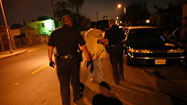Teacher responses to the 2010 release
The following is a list of teacher responses to their "value-added" ratings during the intial release in 2010. See the most recent responses »
The Times gave LAUSD elementary school teachers rated in this database the opportunity to preview their value-added evaluations and publicly respond. Some issues raised by teachers may be addressed in the FAQ. Teachers who have not commented may do so by contacting The Times.
|
|
 Delicious
Delicious
|
 Digg
Digg
|
 Facebook
Facebook
|
 Twitter
Twitter
|





Thanks, I feel this is pretty accurate overall. I hope the times takes into account outside factors which are plentiful, believe me.
Thanks,
R.O.
August 17, 2010 at 10:01 p.m.
It would be so much more rewarding to be deemed a "most effective" teacher by some measure other than standardized test scores.
August 17, 2010 at 9:44 p.m.
Initially I was very skeptical about this data because I teach English language learners at a Title 1 school and I teach third grade. But after reading the FAQ, I see that these scores are not unduly influenced by which teachers have high performing students versus those students who struggle academically. Since it appears the Times has taken all these factors into account, I was gratified to see that I am considered an effective teacher. Additionally, it motivates me to move my "diamonds" further to the right! I've been teaching for 20 years and this is the first time I've gotten an idea of how my students have fared in my classes and how I am doing as a teacher. However controversial the value-added scoring system may be, it appears to be a more meaningful measurement of teacher performance than the standard stulls done by principals.
August 17, 2010 at 9:24 p.m.
For the past 4 years, I have been assigned to teach the gifted class. Most of my students enter my classroom already scoring at the highest levels on the English test, meaning that there is little room for their scores to increase. I am proud to say that I consistently maintain my students' proficient and advanced scores in English, and I am happy that the analysis shows that my students' math scores outperform expectations.
August 17, 2010 at 9:14 p.m.
I have always felt I was better at teaching English Language Arts than Math so this confirms it. I appreciate seeing my rating because it does give me an assessment of some sorts on how my students perform. I also see it as an indicator, again of some sorts, of how effective I am or am not. This motivates me to work harder.
August 17, 2010 at 7:48 p.m.
To begin with, we departmentalize our math teaching, so I teach only a third of the students in my own class in math. Secondly, often I have students who come into my class scoring as high as 600 on CST exams (all correct) in a subject. Even if they score 600 again the next year, I would be considered average because there is nowhere for them to move. If they go down to 580 (missing one problem), or 560 (missing two) they are losing. I will be rated (less effective) and not as effective as a teacher who has large gains to make. Usually at my school 80% or more of entering students are already proficient or advanced, so I don't see significant gains either way. The curriculum gets harder and my students work to transition to middle school by learning to take responsibility for their own learning. This is something that cannot be evaluated through standardized tests.
This type of evaluation will lead to teachers teaching to a test. As we know students who take preparatory (practice tests) for SAT and college entrance exams do better than students who do not. If test scores will be used to evaluate teachers, then teachers will work on test taking skills and the limited content on standardized tests rather than teaching the child. It will improve test scores, but will it prepare our students for the real world?
The aim of teaching is to teach the whole child and that includes art, drama, dance, physical education, computers, health, social studies and science. Socialization and focusing on teaching children to deal with problems that arise on the playground make for a healthier child who is able to cope in our society. My focus as a teacher is to help children to think, work out their own problems in a socially responsible way and understand the processes by which they learn best.
In addition, children need to learn to be a member of our larger world and community. Teaching the process of a democracy through a democratic classroom will never be tested on standardized tests. Yet if we want an educated voting public, we need to teach it in our schools. Students need to understand propaganda, advertising and how the manipulation of data can skew an issue.(as this article and database does)
This is a flawed idea that will demoralize teachers who work hard with too little resources and support. While I can see the value of looking at this as a staff, there is little value in rating teachers this way. Teachers could look at this data and share best practices and how to improve student achievement. If it is used as teacher evaluation, it will pit teachers against each other. Every year we study student data to improve instruction and how content is delivered, but where is the monetary support for teachers to get the meaningful professional development to improve instructional strategies?
It would be nice if the LA Times worked for ways to raise revenues for our schools instead of trying to tear teachers down and break our spirits.
August 17, 2010 at 7:42 p.m.
L A Times Rebuttal
Quite frankly I’m extremely confused about how the L. A. Times value-added measure of effective performance is calculated. Since at best my effectiveness is merely average, then why in the real world do parents repeatedly request that their subsequent children be taught by me? More often than not I teach all the children in a family by request. Why am I considered a good, if not excellent teacher by my peers? Additionally, I have been nominated by former students when graduating from High School as an excellent teacher that has had a positive influence in their lives and their education. Furthermore, I’ve been included in the Who’s Who Among America’s Teachers on several occasions.
In our current economic recession, when more experienced teachers have taken what amounts to a two-year pay cut to keep good, though less experienced teachers, from leaving education entirely, this so called L. A. Times value-added measure of performance emerges at about the same time as our state has released the current CST scores. This L. A. Times value-added measure of effective performance strongly reeks as another method of teacher bashing.
Students are not widgets, how dare the L. A. Times treat my students as such?
Furthermore, I consider myself an effective teacher, though that in no way limits me to remain stagnant. I am constantly learning, and strengthening my craft. I enjoy teaching my students to become life long learners by example. Perhaps, the L. A. Times value-added measure of effective performance needs to be recalculated to address student’s real learning.
August 17, 2010 at 7:41 p.m.
Value-added scores are a vlaid tool to measure teacher effectiveness to a certain point, but should not be used as an evaluative measure. It should serve as a means for professional development and growth, epecially when pinpointing areas of further growth as an educator. In hindsight it is disappointing that the district did not enable educators access to this data previously, and perhaps offer professional development opportunities by highly effective teachers.
August 17, 2010 at 7:25 p.m.
I wish I'd had access to this type of data my very first year of teaching. We give students scores to let them know how they rank and where they need to improve. Maybe it's time teachers are given the same. I can't wait for future articles from the Times analyzing what may separate me, an "average" teacher, from an extremely effective one. It's sad that teachers have had to wait for information like this from a newspaper, rather than getting it from our district much sooner. No one likes to learn of their own shortcomings, but it's hard to improve if you don't even know where you stand.
August 17, 2010 at 7:23 p.m.
I was sure I was an effective teacher before the L.A. Times told me so and actually I'm a "most effective" teacher according to one arbitrary database. But I know that some of my colleagues who are good teachers won't be rated as such, and that's unfair.
There are so many other factors to consider when dealing with student achievement that your writers glossed over. Even worse, they portrayed teachers as excuse making racists. I've taught for over 14 years and hopefully have made a beneficial impact on my students lives. According to the formula you espouse, I'm in the top five percent of my profession so maybe my experience and my newly anointed title of “most effective” teacher will carry some weight when I tell you that based on anecdotal evidence, socio-economic status, and the level of education the parents have attained hugely impacts the ability of students achievement no matter how motivating I am or how hard I teach. Additionally, 5th grade students today are faced with far more distractions than we grew up with. I'm not sure how the saying goes, but this isn't your parents elementary school. Yes, teachers should be held accountable but is this formula a true rendering of a persons worth and performance, and should you be ridiculed in public for trying to do a job few would even try? On that note, I have not received a raise, or even a COLA (cost of living allowance), since 2006. I make $61,000 a year with a doctorate degree and 14 years of experience - that is less than the night janitor with a GED makes with overtime at LAUSD.
The last point I would like to make is this: should we rate and evaluate newspaper writers on who misquoted, misspelled, or flat out fabricated stories and put their names and pictures (or even their retractions) on the front page? If that were the case, the person who was responsible for proofing your LAUSD value-added measure of performance pages should be on the Time’s front page next to the “non-effective” teacher‘s picture, because of the glaring spelling and grammar mistakes I found there. Following that logic, what about firefighters who are not able to save someone? Should the headline go like this, “Firefighter 'A' according to data, failed to save 10 people this year while firefighter 'B' saved 3” leaving out many of the factors that go into saving lives. Should he be judged solely on that and not on all the factors that make up his job? Robert E. Borowski
August 17, 2010 at 7:04 p.m.